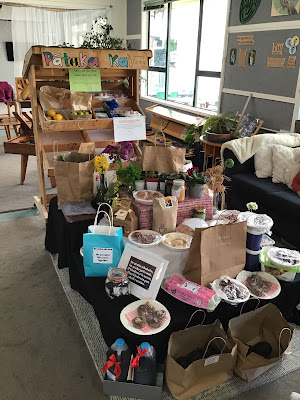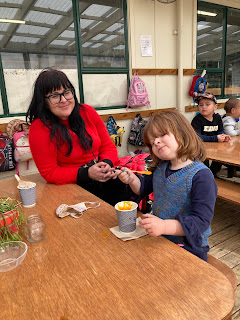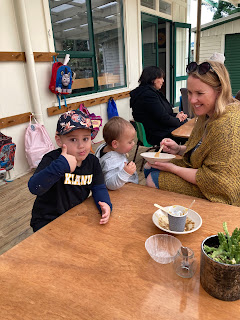At Mairtown
Kindergarten we love to celebrate Matariki (The Māori New Year) because it is
such a special event in Māori culture and for our bicultural nation. As the
twinkling stars of Matariki rise in the winter sky, this is a time for people
to come together, to remember their ancestors, to share kai, sing and tell
stories. This celebration reminds us of the cycle of life, and natural ways of
marking the passage of time. It is certainly a ritual which is very much looked
forward to and treasured by the whole community of Mairtown Kindergarten,
warming our hearts as we come together, reflecting on the past and making plans
for the future.
On Tuesday the 14th June we hosted our annual ‘Harvest Day’ at Mairtown Kindergarten. Whānau were invited to bring a gift from their garden or a home-made treat, along with a whakatauki or thought to nourish the receiver’s heart. We had such a lovely response, and it was evident that lots of joy and love was shared, given, and received throughout this day.
Harvest Day
is all about ‘random acts of kindness’. The gifts were placed on our harvest
table and at the end of the day tamariki and their whānau were able to choose something from the table to take home.
“The
act of giving expands one’s entire life experience because nothing is more
fulfilling than one’s capacity to give.”
(P. Rashad)
On Tuesday
21st June we hosted our annual Mairtown Kindergarten celebration, the last
event of our Matariki festival events. Leading up to this much anticipated
gathering, the tamariki prepared artwork that was displayed all over the
kindergarten.
Together we
planned what kai we would make. In past years we celebrated this event with a
shared hāngī meal but due to the current Covid gathering restrictions we needed to come
up with another option this year. We decided to move our shared feast to be an outdoor lunch, so whānau could come between 11.30 and 1pm to share hot soup, mince stew, seafood chowder and
fried bread with anything chocolate for dessert!
‘Ngā kai a
Matariki nāna i ao ake nei'
'Food that is
scooped up by Matariki'
The above
whakatauki speaks of when Matariki rises in the month of Pipiri and food is
cooked and offered upon its appearance. Matariki is weak and cold from carrying
out its annual duties, so at the time the constellation reappears in our skies Māori would prepare a celebratory hangi, releasing the steam to
replenish its strength for the coming year.
We have had
many discussions about what Matariki means and have gained information from
pukapuka and by watching small videos together. One story that captured the interest of our
tamariki was the purakau with tells of the earth mother Papatūānuku and sky father, Ranginui being separated by their
children. This event led to the creation of life and also the constellation of Matariki. Another story that had been popular with our tamariki has been ‘The Seven Kites of Matariki’.
“What is Matariki?” – Tamariki began sharing their thoughts:
“It means you have to share food and you get to get your whānau” – Paulie
“Matariki
stars the little ones, I saw some yesterday when it was dark, they were little
ones”
– Aki
“The
Matariki stars, they shine, and they twinkle and twinkle and twinkle too, and
they sparkle, sparkle and they sparkle and sparkle” – Torin
“A
cluster of stars” – Leo
“Stars”
– Leia
We explored all the stars, Waitī, Waitā, Waipuna-ā-rangi, Tupu-ā-nuku, Tupu-ā-rangi, Ururangi, Pōhutukawa, Hiwai-te-rangi and Matariki, learning what each star represented, using our lovely resource 'The stars of Matariki', By Anne Bawden, adapted from the magnetic story by Teacher Talk. These were then used for inspiration for some of our artwork that was created and displayed.
Matariki hunga
Matariki ahunga nui
Matariki has many admirers,
Matariki brings us together.
The day
before our lunch, tamariki prepared the vegetables, together peeling, chopping,
and smashing the pumpkins open (as we have done for many years) and harvesting
our celery and kale from our own vegetable gardens at the kindergarten. Our
worms also enjoyed all our kumara peelings once we had finished.
On Tuesday
Kaiako got to work in the kitchen with the help of our professional practice
manager Kim Townsend. Soup was put on, the mince stew was cooking and the fried
bread frying. The kindergarten smelt amazing.
At 11.30am
whānau began to arrive, and after a quick opening and mihi mo te kai, whānau
and their tamariki made their way inside to choose their lunch, before sitting
outside to share delicious kai and korero together. More whānau arrived
throughout the afternoon and it was great to feel a sense of connection again
after such a long time.
Lastly, we had our wishing tree, where tamariki were able to make a wish on a star, placing it the tree. This was inspired by Hiwa-i-te-rangi, the wishing star who grants the wishes of our heart, helping us to realise our dreams for the coming year.
Ana, i te
atapō tonu ka rewa ake a Matariki ka kitea mai, ā koirā te tohu o te tau hau.
Therefore, in
the early morning when Matariki is seen rising, this is the sign of the new
year.







































